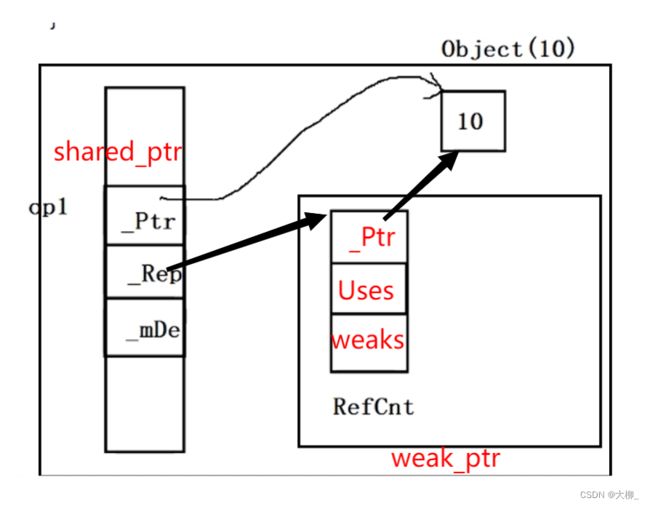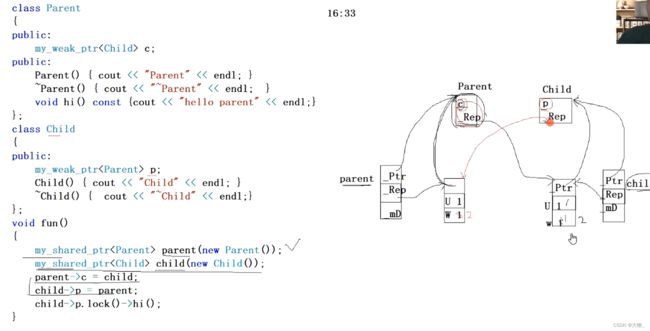- 字符串作为数组和用指针指向的字符串的区别
kfhj
c语言
字符串作为数组和用指针指向的字符串在C语言(以及类似语言如C++)中都有各自的用途和特点。以下是它们之间的主要区别:定义和声明•字符串作为数组:字符串数组是一个字符数组,其中最后一个字符是空字符(’\0’),用于标识字符串的结束。例如:charstr[]=“Hello,World!”;这里,str是一个字符数组,包含了字符串"Hello,World!"和它的结尾空字符。•用指针指向的字符串:字符串
- CMake 开发库(Library)的最佳实践
arong-xu
CMakec++CMake最佳实践
1.使用ModernCMake开发库CMake在C++社区中非常流行,可以说是事实上的C++包管理工具.在MeetingC++开发者调查中,有75.73%的受访者表示自己使用CMake作为构建工具.选择一个广泛流行的工具来打包库意味着你的项目更容易被别人使用.本文将从一个简单的库的打包样例开始,介绍编写CMake的最佳实践.由于CSDN的markdown不支持highlight特定行,有兴趣的读者
- c ++零基础可视化——数组
zhangpz_
算法c++
c++零基础可视化数组一些知识:关于给数组赋值,一个函数为memset,其在cplusplus.com中的描述如下:void*memset(void*ptr,intvalue,size_tnum);Setsthefirstnumbytesoftheblockofmemorypointedbyptrtothespecifiedvalue(interpretedasanunsignedchar).将p
- P3375 【模板】KMP
好好学习^按时吃饭
算法
题目来自洛谷网站:思路:从题目名字知道这是KMP模板题目,对于KMP算法,就两步,1、构造next数组。2、在s1中找到s2出现的位置。KMP代码:#includeusingnamespacestd;constintN=1e6+10;chars1[N],s2[N];//全局变量名字不能定义为next//C++标准库中有一个函数名字是nextintnext1[N];//ne数组intmain(){/
- CentOS7 python安装Ta-lib 0.6.x【talib不能直接安装,必须先安装ta_lib之c++库才可以】
weixin_43343144
服务器运维
正常流程:CentOS7python安装Ta-lib【talib不能直接安装,必须先安装ta_lib之c++库才可以】_centos7安装ta-lib-CSDN博客不同的版本参考如下!参考官方文档:ta-lib·PyPI务必下载匹配版本的【ta-lib-0.6.4-src.tar.gz】才可以正常安装$wgethttps://github.com/ta-lib/ta-lib/releases/do
- 第二十二章: 静态多态与动态多态的衔接_《C++ Templates》notes
郭涤生
c/c++c++开发语言笔记
静态多态与动态多态的衔接核心知识点代码示例与测试用例测试用例输出多选题设计题关键技术总结核心知识点静态多态vs动态多态静态多态:编译期多态,通过模板实现,代码生成效率高,但灵活性差。动态多态:运行期多态,通过虚函数实现,灵活性高,但存在虚表开销。类型擦除(TypeErasure)核心思想:将不同类型的对象统一为通用接口,隐藏具体类型信息。实现方式:通常结合基类指针和模板注册机制。桥接模式(Brid
- jetson nano 实现串口的字节输出
诶我就不告诉你
单片机嵌入式硬件
实现jetosnnano的字节输出,但是存在一定的问题主要为在制作数据包的过程中,我遇到了当输出字节为0x0a的情况下串口会连续输出0x0d0x0a这时候需要在串口部分进行一定的配置防止自动换行的输出/*防止自动换行*/opt.c_oflag&=~OPOST;//禁用输出处理标志,防止自动转换换行符感谢博主JetsonNano入坑之路----(10)C/C++语言读写UART或USB串口数据_je
- C++在线OJ负载均衡项目
平凡的小y
c++开发语言
1.演示项目项目源码链接:2.项目所用技术和开发环境所用技术C++STL标准库Boost准标准库(字符串切割)cpp-httplib第三方开源网络库ctemplate第三方开源前端网页渲染库jsoncpp第三方开源序列化、反序列化库负载均衡设计MySQLCconnectAce前端在线编辑器html/css/js/jquery/ajax开发环境Ubuntu云服务器vscodeMysqlWorkben
- C++:函数指针进阶(三):Lambda函数详解:概念详解
FishAnd_Yu
#C++精华c++C++Lamdba
1:Lambda函数语法C++语法的基本格式为:[capture](parameters)->return_type{/*...*/}(1)[capture]:[]内为外部变量的传递方式,值、引用等,如下[]//表示的是在lambda定义之前的域,对外部参数的调用;[=]//表示外部参数直接传值[&]//表示外部参数传引用,可修改值。当默认捕获符是&时,后继的简单捕获符必须不以&开始。而当默认捕获
- 于STM32F103C8T6的智能灯泡控制系统C++源码实现
程序员Thomas
STM32单片机智能灯泡stm32c++嵌入式硬件
以下是一个基于STM32F103C8T6的智能灯泡控制系统C++源码实现,整合了PWM调光、WiFi控制和环境感知功能。该代码已在STM32CubeIDE中验证,支持直接烧录运行:#include"main.h"#include#include"wifi.h"//LED设备抽象类(3设计)classLEDDevice{protected:TIM_HandleTypeDef*pwmTimer;uin
- 基于STM32的平衡车外设控制应用案例,提供C++源码
程序员Thomas
STM32单片机平衡车stm32c++单片机
基于STM32的平衡车外设控制应用案例**下面是一个使用STM32控制平衡车的简单应用案例,包含姿态传感器读取、电机控制和串口通信功能。主要功能使用MPU6050传感器读取姿态数据使用PID控制器调整平衡车姿态通过串口输出调试信息电机速度控制C++源代码#include"stm32f10x.h"#include//定义常量#definePWM_MIN1000#definePWM_MAX2000#d
- 深入理解C++中的std::string::substr成员函数:子串操作的艺术
星途码客
c++c++开发语言
引言在C++编程中,字符串处理是一项常见且重要的任务。std::string类作为C++标准库中的一部分,提供了丰富的成员函数来支持字符串的各种操作,其中substr成员函数在获取字符串子串方面扮演着关键角色。本文将深入探讨std::string::substr函数的工作原理、使用方法、异常处理以及性能考量,帮助读者全面掌握这一强大的字符串处理工具。题目:探索C++std::string::sub
- npm error gyp info
计算机辅助工程
npm前端node.js
在使用npm安装Node.js包时,可能会遇到各种错误,其中gyp错误是比较常见的一种。gyp是Node.js的一个工具,用于编译C++代码。这些错误通常发生在需要编译原生模块的npm包时。下面是一些常见的原因和解决方法:常见原因及解决方法Python未安装或版本不兼容:Node.js使用Python来运行gyp。确保你的系统上安装了Python,并且版本与node-gyp兼容。通常推荐使用Pyt
- C++缺省参数函数重载
ConFig.
c++算法数据结构
缺省参数大家知道什么是备胎吗?C++中函数的参数也可以配备胎。3.1缺省参数概念缺省参数是声明或定义函数时为函数的参数指定一个默认值。在调用该函数时,如果没有指定实参则采用该默认值,否则使用指定的实参。voidTestFunc(inta=0){cout_a=(int*)malloc(sizeof(int)*capacity);ps->_top=0;ps->_capacity=capacity;}i
- L2-050懂蛇语c++(pta天梯赛。测试点1。)
zzy678
c++
这个题目看上去还挺简单的,但是自己做的时候就超时了一开始只有19分。我自己stl学的不是很好,然后一开始自己用的pair和vector一起写的发现了一些小问题改了之后才得19。。。其中两个就是超时问题。可能查找太慢?之后又查看了一些别人写的,参考了使用map和vector混用的方法就很好过了,但是那个测试点1就是过不了。最后,我发现就是首字的处理方式应该优化。一个小小小坑。大家注意。#includ
- C语言_数据结构总结8:链式队列
*.✧屠苏隐遥(ノ◕ヮ◕)ノ*.✧
C语言—数据结构数据结构c语言开发语言visualstudiovisualstudio链表
纯C语言实现,不涉及C++链队列队列的链式表示称为链队列,它实际上是一个同时具有队头指针和队尾指针的单链表,头指针指向对头结点,尾指针指向队尾结点。头结点是链式队列中的特殊结点,通常不存储实际的队列元素数据,其主要作用是方便对队列的操作,例如在进行入队、出队操作时,可以统一操作逻辑,无需特殊处理队列为空的情况。它作为队列的头部标识,其next指针指向队列中的第一个真正存储数据的结点。尾结点(注意区
- C语言_数据结构总结10:二叉树的递归/非递归遍历
*.✧屠苏隐遥(ノ◕ヮ◕)ノ*.✧
C语言—数据结构数据结构算法链表visualstudiovisualstudioc语言b树
纯C语言实现,不涉及C++遍历是二叉树各种操作的基础,例如对于一棵给定二叉树求结点的双亲/求结点的孩子/求二叉树的高度/求叶结点个数/判断两棵二叉树是否相等……所有这些操作都是在二叉树遍历的过程中进行的。因此必须掌握二叉树的各种遍历过程,并能灵活用以解决各种问题。常见的遍历次序有:先序,中序,后序->其中“序”是指根结点何时被访问。先序:根结点->左子树->右子树中序:左子树->根结点->右子树后
- 编译链接过程
YancyKahn
编译链接编译链接GCC
编译链接过程C/C++程序从文本到可执行文件之间是一个复杂的过程.对于源代码(.c/.cpp)文件我们是不能直接运行的,必须经过一系列的处理才能转化为机器语言,再通过链接相应的文件转化为可执行程序.这个过程称为编译链接过程.本文篇幅较长,想直接看分析过程点击这里下面是从源代码到可执行文件的整个编译链接的过程:整个编译链接过程无非就分为编译过程和链接过程1.编译过程C文件编译过程又可分为:编译和汇编
- 第十八章:模板的多态力量_《C++ Templates》notes
郭涤生
c/c++c++开发语言笔记
模板的多态力量一、动态多态vs静态多态二、奇异递归模板模式(CRTP)三、策略模式(编译期策略选择)关键要点总结第一部分:多选题(10题)第二部分:设计题(5题)答案与详解多选题答案:设计题参考答案1.编译期策略选择器2.类型安全访问者模式3.概念约束数学库4.编译期工厂模式5.静态多态容器测试说明一、动态多态vs静态多态核心概念:动态多态:基于虚函数和继承体系,函数调用在运行时决定(通过虚函数表
- CPP编译与链接过程
阿斯顿的风格
c++开发语言ubuntulinuxbash编译汇编
1.概述在C++中,从源代码(.cpp文件)到最终可执行程序,需要经历以下四个主要阶段:预处理(Preprocessing)编译(Compilation)汇编(Assembly)链接(Linking)2.预处理预处理阶段是编译流程的第一步,主要处理以#开头的指令,包括宏定义、文件包含以及条件编译等。2.1文件包含(#include)工作原理:当预处理器遇到#include指令时,会在文件系统中查找
- 第十七章:Future Directions_《C++ Templates》notes
郭涤生
c/c++c++开发语言笔记
FutureDirections核心重难点:示例代码:设计题多选题答案设计题详解核心重难点:泛型非类型模板参数允许任意类型作为非类型模板参数(如template)需解决类型推导和链接问题编译期控制流constexprif替代模板偏特化(减少代码膨胀)折叠表达式优化可变参数模板处理反射与元编程增强类型检查(is_convertible_v等)反射提案(如成员变量/函数查询)模块化支持解决传统头文件包
- 访问者模式【行为模式C++】
GoWjw
设计模式访问者模式
1.概述访问者模式是一种行为设计模式,它能将算法与其所作用的对象隔离开来。访问者模式主要解决的是数据与算法的耦合问题,尤其是在数据结构比较稳定,而算法多变的情况下。为了不污染数据本身,访问者会将多种算法独立归档,并在访问数据时根据数据类型自动切换到对应的算法,实现数据的自动响应机制,并确保算法的自由扩展。访问者模式在实际开发中使用的非常少,因为它比较难以实现并且应用该模式肯能会导致代码的可读性变差
- 【分治法】最接近点对问题 C++(附代码分析及实例)
haaaaaaarry
算法设计与分析算法
问题描述给定平面上n个点,找其中的一对点,使得在n个点组成的所有点对中,该点对间的距离最小问题分析先考虑一下一维情况下,取中间某个点m,将所有点划分为两个集合,递归的找出左右集合的最接近点对,最后再和最靠近点m的左右两点间的距离作比较,最小的就是整个点对中最接近的现在将一维的情况扩展到二维,二维比一维复杂的地方在于每个点都有两个坐标,我们用一条直线l将平面上的所有点同样分成两个集合,再递归的去两个
- 浅谈VB.NET为何还没有被时代淘汰
练习AI两年半
.net
最近在做一个旧项目的更新和维护,比较头疼的是这个项目是08年写的,当时编写编写语言为c++、环境为vc6.0+MFC(嘶~,这玩意儿年纪比我还大),需要将环境改为VS2022、.NET框架,为配合项目组其他同事,新语言改用VB.NET。我之前一直在用C++和QT写项目,一时间让我换一种语言和框架,还要在c++和vb.net之间反复横跳确实让我很崩溃。但打工人再难的项目也要硬着头皮上呀,好在VB.N
- conda install 和 pip install 的区别
不知江月待何人..
深度学习
condainstall和pipinstall是两个常用的包安装命令,但它们在很多方面存在差异。1.所属管理系统不同1.1condainstallcondainstall是Anaconda和Miniconda发行版自带的包管理工具conda的安装命令。conda是一个跨平台的开源包管理系统和环境管理系统,它不仅可以管理Python包,还能管理其他语言(如R、C++等)的包。conda更侧重于数据科
- 在 C 和 C++ 编程里,要引用一个文件中的函数,包含头文件和使用extern,通常包含头文件是更好的做法
weixin_44799641
C/C++c语言c++
在C和C++编程里,要引用一个文件中的函数,通常包含头文件是更好的做法,下面为你详细分析:包含头文件优点代码清晰规范:在源文件里包含函数声明所在的头文件,能让代码结构更清晰,其他人阅读代码时能很容易明白函数的来源和用途。比如,#include"can_port.h"这样的语句明确表示该源文件要使用can_port.h头文件里声明的函数。自动更新声明:要是函数的声明有变动,只需修改头文件,所有包含该
- C++ 地图 + 配对组合!3 分钟吃透 map 和 pair 的黄金搭档
Reese_Cool
STL数据结构与算法c++算法开发语言stl
文章目录pair一、基本概念二、pair的声明与初始化三、成员访问与修改四、常用操作1.比较运算2.交换值3.tie函数(解包pair)五、pair的应用场景六、pair与结构体/类的对比七、pair与tuple的对比八、代码示例1.返回多个值2.存储键值对九、总结map一、基本概念二、map的声明与初始化三、常用操作四、map的应用场景五、注意事项在C++编程里,map和pair是标准库中十分实
- 第十六章:Specialization and Overloading_《C++ Templates》notes
郭涤生
c/c++c++开发语言笔记
SpecializationandOverloading一、模板特化与重载的核心概念二、代码实战与测试用例三、关键知识点总结四、进阶技巧五、实践建议多选题设计题代码测试说明一、模板特化与重载的核心概念函数模板重载(FunctionTemplateOverloading)//基础模板templateTmax(Ta,Tb){returna>b?a:b;}//显式特化(FullSpecializatio
- AtCoder备赛冲刺必刷题(C++) | 洛谷 AT_abc396_a Triple Four
热爱编程的通信人
c++算法开发语言
本文分享的必刷题目是从蓝桥云课、洛谷、AcWing等知名刷题平台精心挑选而来,并结合各平台提供的算法标签和难度等级进行了系统分类。题目涵盖了从基础到进阶的多种算法和数据结构,旨在为不同阶段的编程学习者提供一条清晰、平稳的学习提升路径。欢迎大家订阅我的专栏:算法题解:C++与Python实现!附上汇总贴:算法竞赛备考冲刺必刷题(C++)|汇总【题目来源】洛谷:AT_abc396_a[ABC396A]
- C/C++数据类型--整型类型
蓝心湄
C/C++数据类型c语言
概念数据类型表示的是数据的身份决定它可以进行什么操作、占用多少空间与数据结构的区别数据类型更倾向于表示数据的身份数据结构表示的是怎么操作数据(是在类型的基础上进行对数据的操作的)C语言允许使用的类型类型的分类算术类型:基本类型和枚举类型纯量类型:算术类型和指针类型组合类型:数组类型和结构体类型整型数据基本整型(int)长度为2字节或4字节短整型(shortint)长度为2字节长整型(longint
- [黑洞与暗粒子]没有光的世界
comsci
无论是相对论还是其它现代物理学,都显然有个缺陷,那就是必须有光才能够计算
但是,我相信,在我们的世界和宇宙平面中,肯定存在没有光的世界....
那么,在没有光的世界,光子和其它粒子的规律无法被应用和考察,那么以光速为核心的
&nbs
- jQuery Lazy Load 图片延迟加载
aijuans
jquery
基于 jQuery 的图片延迟加载插件,在用户滚动页面到图片之后才进行加载。
对于有较多的图片的网页,使用图片延迟加载,能有效的提高页面加载速度。
版本:
jQuery v1.4.4+
jQuery Lazy Load v1.7.2
注意事项:
需要真正实现图片延迟加载,必须将真实图片地址写在 data-original 属性中。若 src
- 使用Jodd的优点
Kai_Ge
jodd
1. 简化和统一 controller ,抛弃 extends SimpleFormController ,统一使用 implements Controller 的方式。
2. 简化 JSP 页面的 bind, 不需要一个字段一个字段的绑定。
3. 对 bean 没有任何要求,可以使用任意的 bean 做为 formBean。
使用方法简介
- jpa Query转hibernate Query
120153216
Hibernate
public List<Map> getMapList(String hql,
Map map) {
org.hibernate.Query jpaQuery = entityManager.createQuery(hql);
if (null != map) {
for (String parameter : map.keySet()) {
jp
- Django_Python3添加MySQL/MariaDB支持
2002wmj
mariaDB
现状
首先,
[email protected] 中默认的引擎为 django.db.backends.mysql 。但是在Python3中如果这样写的话,会发现 django.db.backends.mysql 依赖 MySQLdb[5] ,而 MySQLdb 又不兼容 Python3 于是要找一种新的方式来继续使用MySQL。 MySQL官方的方案
首先据MySQL文档[3]说,自从MySQL
- 在SQLSERVER中查找消耗IO最多的SQL
357029540
SQL Server
返回做IO数目最多的50条语句以及它们的执行计划。
select top 50
(total_logical_reads/execution_count) as avg_logical_reads,
(total_logical_writes/execution_count) as avg_logical_writes,
(tot
- spring UnChecked 异常 官方定义!
7454103
spring
如果你接触过spring的 事物管理!那么你必须明白 spring的 非捕获异常! 即 unchecked 异常! 因为 spring 默认这类异常事物自动回滚!!
public static boolean isCheckedException(Throwable ex)
{
return !(ex instanceof RuntimeExcep
- mongoDB 入门指南、示例
adminjun
javamongodb操作
一、准备工作
1、 下载mongoDB
下载地址:http://www.mongodb.org/downloads
选择合适你的版本
相关文档:http://www.mongodb.org/display/DOCS/Tutorial
2、 安装mongoDB
A、 不解压模式:
将下载下来的mongoDB-xxx.zip打开,找到bin目录,运行mongod.exe就可以启动服务,默
- CUDA 5 Release Candidate Now Available
aijuans
CUDA
The CUDA 5 Release Candidate is now available at http://developer.nvidia.com/<wbr></wbr>cuda/cuda-pre-production. Now applicable to a broader set of algorithms, CUDA 5 has advanced fe
- Essential Studio for WinRT网格控件测评
Axiba
JavaScripthtml5
Essential Studio for WinRT界面控件包含了商业平板应用程序开发中所需的所有控件,如市场上运行速度最快的grid 和chart、地图、RDL报表查看器、丰富的文本查看器及图表等等。同时,该控件还包含了一组独特的库,用于从WinRT应用程序中生成Excel、Word以及PDF格式的文件。此文将对其另外一个强大的控件——网格控件进行专门的测评详述。
网格控件功能
1、
- java 获取windows系统安装的证书或证书链
bewithme
windows
有时需要获取windows系统安装的证书或证书链,比如说你要通过证书来创建java的密钥库 。
有关证书链的解释可以查看此处 。
public static void main(String[] args) {
SunMSCAPI providerMSCAPI = new SunMSCAPI();
S
- NoSQL数据库之Redis数据库管理(set类型和zset类型)
bijian1013
redis数据库NoSQL
4.sets类型
Set是集合,它是string类型的无序集合。set是通过hash table实现的,添加、删除和查找的复杂度都是O(1)。对集合我们可以取并集、交集、差集。通过这些操作我们可以实现sns中的好友推荐和blog的tag功能。
sadd:向名称为key的set中添加元
- 异常捕获何时用Exception,何时用Throwable
bingyingao
用Exception的情况
try {
//可能发生空指针、数组溢出等异常
} catch (Exception e) {
- 【Kafka四】Kakfa伪分布式安装
bit1129
kafka
在http://bit1129.iteye.com/blog/2174791一文中,实现了单Kafka服务器的安装,在Kafka中,每个Kafka服务器称为一个broker。本文简单介绍下,在单机环境下Kafka的伪分布式安装和测试验证 1. 安装步骤
Kafka伪分布式安装的思路跟Zookeeper的伪分布式安装思路完全一样,不过比Zookeeper稍微简单些(不
- Project Euler
bookjovi
haskell
Project Euler是个数学问题求解网站,网站设计的很有意思,有很多problem,在未提交正确答案前不能查看problem的overview,也不能查看关于problem的discussion thread,只能看到现在problem已经被多少人解决了,人数越多往往代表问题越容易。
看看problem 1吧:
Add all the natural num
- Java-Collections Framework学习与总结-ArrayDeque
BrokenDreams
Collections
表、栈和队列是三种基本的数据结构,前面总结的ArrayList和LinkedList可以作为任意一种数据结构来使用,当然由于实现方式的不同,操作的效率也会不同。
这篇要看一下java.util.ArrayDeque。从命名上看
- 读《研磨设计模式》-代码笔记-装饰模式-Decorator
bylijinnan
java设计模式
声明: 本文只为方便我个人查阅和理解,详细的分析以及源代码请移步 原作者的博客http://chjavach.iteye.com/
import java.io.BufferedOutputStream;
import java.io.DataOutputStream;
import java.io.FileOutputStream;
import java.io.Fi
- Maven学习(一)
chenyu19891124
Maven私服
学习一门技术和工具总得花费一段时间,5月底6月初自己学习了一些工具,maven+Hudson+nexus的搭建,对于maven以前只是听说,顺便再自己的电脑上搭建了一个maven环境,但是完全不了解maven这一强大的构建工具,还有ant也是一个构建工具,但ant就没有maven那么的简单方便,其实简单点说maven是一个运用命令行就能完成构建,测试,打包,发布一系列功
- [原创]JWFD工作流引擎设计----节点匹配搜索算法(用于初步解决条件异步汇聚问题) 补充
comsci
算法工作PHP搜索引擎嵌入式
本文主要介绍在JWFD工作流引擎设计中遇到的一个实际问题的解决方案,请参考我的博文"带条件选择的并行汇聚路由问题"中图例A2描述的情况(http://comsci.iteye.com/blog/339756),我现在把我对图例A2的一个解决方案公布出来,请大家多指点
节点匹配搜索算法(用于解决标准对称流程图条件汇聚点运行控制参数的算法)
需要解决的问题:已知分支
- Linux中用shell获取昨天、明天或多天前的日期
daizj
linuxshell上几年昨天获取上几个月
在Linux中可以通过date命令获取昨天、明天、上个月、下个月、上一年和下一年
# 获取昨天
date -d 'yesterday' # 或 date -d 'last day'
# 获取明天
date -d 'tomorrow' # 或 date -d 'next day'
# 获取上个月
date -d 'last month'
#
- 我所理解的云计算
dongwei_6688
云计算
在刚开始接触到一个概念时,人们往往都会去探寻这个概念的含义,以达到对其有一个感性的认知,在Wikipedia上关于“云计算”是这么定义的,它说:
Cloud computing is a phrase used to describe a variety of computing co
- YII CMenu配置
dcj3sjt126com
yii
Adding id and class names to CMenu
We use the id and htmlOptions to accomplish this. Watch.
//in your view
$this->widget('zii.widgets.CMenu', array(
'id'=>'myMenu',
'items'=>$this-&g
- 设计模式之静态代理与动态代理
come_for_dream
设计模式
静态代理与动态代理
代理模式是java开发中用到的相对比较多的设计模式,其中的思想就是主业务和相关业务分离。所谓的代理设计就是指由一个代理主题来操作真实主题,真实主题执行具体的业务操作,而代理主题负责其他相关业务的处理。比如我们在进行删除操作的时候需要检验一下用户是否登陆,我们可以删除看成主业务,而把检验用户是否登陆看成其相关业务
- 【转】理解Javascript 系列
gcc2ge
JavaScript
理解Javascript_13_执行模型详解
摘要: 在《理解Javascript_12_执行模型浅析》一文中,我们初步的了解了执行上下文与作用域的概念,那么这一篇将深入分析执行上下文的构建过程,了解执行上下文、函数对象、作用域三者之间的关系。函数执行环境简单的代码:当调用say方法时,第一步是创建其执行环境,在创建执行环境的过程中,会按照定义的先后顺序完成一系列操作:1.首先会创建一个
- Subsets II
hcx2013
set
Given a collection of integers that might contain duplicates, nums, return all possible subsets.
Note:
Elements in a subset must be in non-descending order.
The solution set must not conta
- Spring4.1新特性——Spring缓存框架增强
jinnianshilongnian
spring4
目录
Spring4.1新特性——综述
Spring4.1新特性——Spring核心部分及其他
Spring4.1新特性——Spring缓存框架增强
Spring4.1新特性——异步调用和事件机制的异常处理
Spring4.1新特性——数据库集成测试脚本初始化
Spring4.1新特性——Spring MVC增强
Spring4.1新特性——页面自动化测试框架Spring MVC T
- shell嵌套expect执行命令
liyonghui160com
一直都想把expect的操作写到bash脚本里,这样就不用我再写两个脚本来执行了,搞了一下午终于有点小成就,给大家看看吧.
系统:centos 5.x
1.先安装expect
yum -y install expect
2.脚本内容:
cat auto_svn.sh
#!/bin/bash
- Linux实用命令整理
pda158
linux
0. 基本命令 linux 基本命令整理
1. 压缩 解压 tar -zcvf a.tar.gz a #把a压缩成a.tar.gz tar -zxvf a.tar.gz #把a.tar.gz解压成a
2. vim小结 2.1 vim替换 :m,ns/word_1/word_2/gc
- 独立开发人员通向成功的29个小贴士
shoothao
独立开发
概述:本文收集了关于独立开发人员通向成功需要注意的一些东西,对于具体的每个贴士的注解有兴趣的朋友可以查看下面标注的原文地址。
明白你从事独立开发的原因和目的。
保持坚持制定计划的好习惯。
万事开头难,第一份订单是关键。
培养多元化业务技能。
提供卓越的服务和品质。
谨小慎微。
营销是必备技能。
学会组织,有条理的工作才是最有效率的。
“独立
- JAVA中堆栈和内存分配原理
uule
java
1、栈、堆
1.寄存器:最快的存储区, 由编译器根据需求进行分配,我们在程序中无法控制.2. 栈:存放基本类型的变量数据和对象的引用,但对象本身不存放在栈中,而是存放在堆(new 出来的对象)或者常量池中(字符串常量对象存放在常量池中。)3. 堆:存放所有new出来的对象。4. 静态域:存放静态成员(static定义的)5. 常量池:存放字符串常量和基本类型常量(public static f


